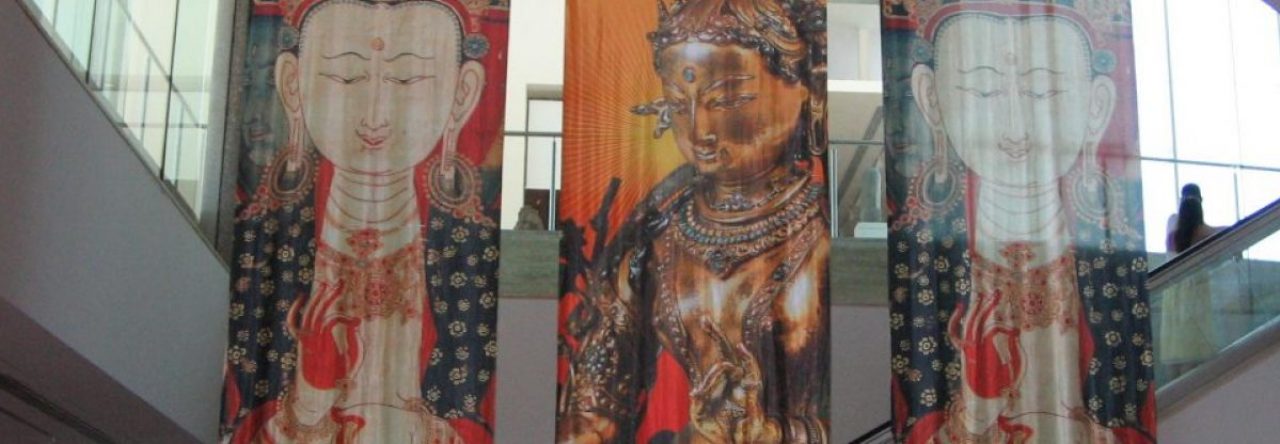Flowers (Puppha Sutta, Samyutta Nikāya 22:94; PTS iii 139)
At Sāvatthī:
I don’t dispute with the world, Practitioners; rather the world disputes with me. One who speaks Dhamma doesn’t dispute with anyone in the world. Whatever the wise consider as not the case in the world, I also say, “That’s not the case.” Whatever the wise consider as the case in the world, I also say “That’s the case.”
And what is it, Practitioners, that the wise agree is not the case in the world; about which I also say, “This is not the case”? The wise agree that a body which is permanent, eternal, stable and immutable is not the case in the world; and, I too say “This is not the case.” And likewise, the wise agree that permanent, eternal, stable and immutable feeling-tones, perceptions, volitional formations, and consciousness are not the case in the world. I too say, “These are not the case.”
This, Practitioners, is what the wise in the world agree upon as not the case, of which I too say, “This is not the case.”
And what is it, Practitioners, that the wise agree is the case in the world; about which I too say, “This is the case”? The wise agree that impermanent, unsatisfactory,* and mutable bodies are the case in the world; and, I too say “This is the case.” And the wise likewise say that impermanent, unsatisfactory, and mutable feeling-tones, perceptions, volitional formations, and consciousness are the case in the world. I too say, “These are the case.”
This, Practitioners, is what the wise in the world agree upon as the case, of which I too say, “This is the case.”
Practitioners, there is a ‘world’ within the world which a tathāgata** directly awakens to and masters. Having done so, he (or she) teaches it, makes it known, sets it going, opens it up, categorizes it, and makes it clear. And what is that ‘world’ within the world which a tathāgata directly awakens to, and masters?
Body, feeling-tones, perceptions, volitional formations and consciousness are the ‘world’ in the world that a tathāgata directly awakens to, and masters. Having done so, she or he teaches this, makes it known, sets it going, opens it up, categorizes it, and makes it clear. When this is taught, made known, set going, opened up, categorized, and made clear, by a tathāgata, then whoever doesn’t experience it, doesn’t realize it, what can I do for that immature, worldly person – blind, without the eyes to see it, unaware, and not realizing this?
Practitioners, just as a blue, red, or white lotus is born in the water, grows up in the water, yet having risen above the water, stands free of the water, in the same way, a tathāgata — born in the world, brought up in the world — lives having mastered the world, being free of the world.
– Translated by Christopher J. Ash. ©2022
NOTES:
* I translate ‘dukkha’ in this sentence as ‘unsatisfactory.’ There are many translations for dukkha. The ‘unsatisfactoriness’ of the ‘world’ of the five sentient processes (the khandas) – is not a matter of their being ultimately, inherently unsatisfactory. It’s ‘unsatisfactory’ from the point of view of relying on that ‘world’ for the deep, stable peace which comes with the transformation of greed, aversion and delusion – that is, with Nibbāna.
** Tathāgata: A fully awakened person. I leave it untranslated, because the translation would have to be based on qualities of a tathāgata which are scattered throughout the suttas, and which are numerous. It could be summed up as one who lives in ‘thusness,’ one who is ‘Such.’ What if you could live stably in the light of being an instance of yourself? That’s the quality of identity which a tathāgata experiences.
In the Aggi-Vacchagotta Sutta (MN 72), the wanderer Vacchagotta was puzzled about how everything that he said to the Buddha about a tathāgata missed the mark. He was trying to pin down what a tathāgata ‘is’ in terms of linguistic dualities, such as ‘existing’ and ‘not existing’; and everything he said was dismissed by the Buddha as not applicable.
Then the Buddha says: “Vaccha, any (concept of) ‘body’ by which someone describing a tathāgata would describe him (or her) – any feeling-tone, perception, mental formation, or consciousness by which you might describe a tathāgata – these he (or she) has abandoned. He/she has destroyed them at the root, made them just like a palmyra stump. He (or she) has cut off the conditions of their development, (so that) they’re not destined for future arising. Freed from these descriptive categories, Vaccha, a tathāgata is deep, boundless, measureless – like an ocean.”
– From Majjhima Nikāya 72. Trans. Christopher J. Ash. (Other translation, by Thanissaro Bhikkhu.)
